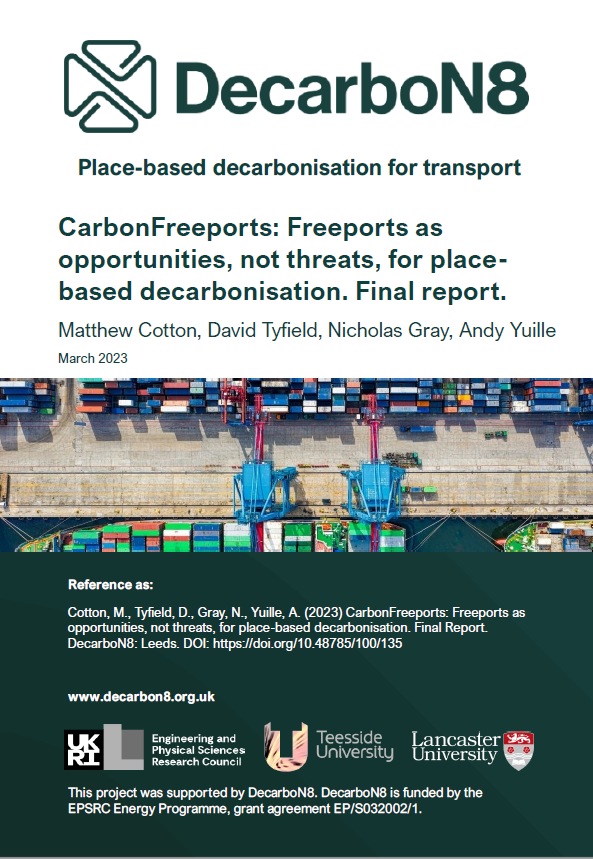CarbonFreePorts: Freeports as opportunities, not threats, for place-based decarbonisation of transport
Authors: Matthew Cotton, David Tyfield, Nicholas Gray, Andy Yuille (2022)
PDF (25 pages, 2 MB)
CarbonFreeports provide a platform from which to explore the role of Freeports in stimulating low carbon forms of mobility, and innovation in transport infrastructure development, planning and practice, and examining the socio-economic and environmental justice implications of current Freeport investment.
Key policy findings
1. Freeport development has had little impact upon regional transportation infrastructure networks into and out of site boundaries given the overlapping governance scales of national, regional and local public transport planning, electric vehicle charging, rail,
road and shipping freight networks. There is a strong risk of carbon-intensive ‘lock-in’ within freight and commuting networks to and from Freeport sites.
2. Freeports can potentially assist low carbon innovation through economic agglomeration – the clustering of net-zero industrial innovation at specific sites. Previous special economic zones have turned to lower value economic activities (e.g., call centres), Freeports must retain a positive and ambitious strategy to promote good quality jobs in net zero industries. There is a need for strong connections with local skills planning and initiatives to ensure that local communities can take advantage of new jobs in established and emerging low-carbon industries.
3. Transparency and good governance require stronger engagement across different scales of government – many local politicians feel under-informed about the Freeport strategy and disengaged from its development.
4. Broader stakeholder engagement with communities beyond just businesses and local authorities is necessary to ensure environmental justice in site planning. Wider engagement with a range of stakeholders has the potential to substantively improve
decision-making, enhance legitimacy and credibility, and contribute to a more just transition to net zero and economic regeneration.
5. Freeport policy risks creating a cycle of hype leading to disappointment and political abandonment in the future. However, it does present a focal point for cross-sectoral co-ordination to develop a systemic vision for local and regional economic regeneration and just transitions, with scope to align market responses to strategies for international trade and low-carbon innovation.
6. “Levelling up” must acknowledge different geographic and governance scales – the Freeports will benefit certain geographies (such as affluent neighborhoods from which high value jobs/high skilled workers are drawn) whereas others, such as residents
living near to ports and freight networks, bear the risks and burdens through air pollution, traffic noise and light pollution. Exploring how this distributive environmental injustice can be addressed is an essential part of a fair CarbonFreeport strategy.
7. Turbulent changes within the leadership of the Conservative Party culminating in the appointment of PM Rishi Sunak, have led to the expansion and scaling up of Freeport sites across the UK, including new announcements for Scotland and Wales. This expansion will likely increase the geographic spread of environmental injustice if low tax-low regulation economic development becomes the norm across the UK.

